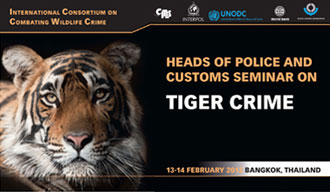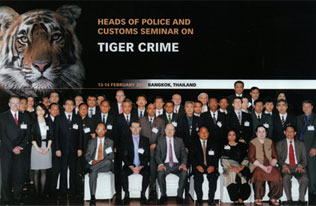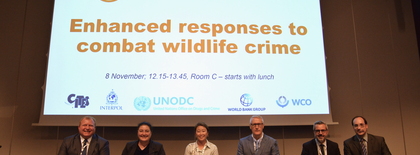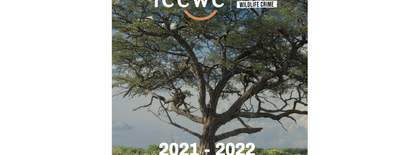Bangkok, Thailand, 14 February, 2012
Executive Director of INTERPOL's Police Service
Leaders of the Customs and Police authorities of the tiger range States
Representatives of the Host Country
Colleagues from the International Consortium on Combating Wildlife Crime
Distinguished participants

- "Our collective enforcement efforts to fight tiger crime must not just
result in seizures - they must result in prosecutions, convictions
and strong penalties to stop the flow of contraband. If we get the
entire enforcement system right for the tiger, we will help save
countless other species together with their ecosystems." CITES
Secretary-General, John E. Scanlon
It is an honour to be at the opening of this Seminar, which is of great importance to everyone who is concerned with the plight of the tiger, including the entire CITES Community.
We are most grateful to the European Commission and the United States of America for their financial support and to the World Bank for its additional funding, which have enabled this Seminar to take place, and to our Host Country, Thailand, which will also be hosting the 16th meeting of the CITES Conference of the Parties in March, 2013.
We also express our sincere gratitude to INTERPOL for taking the lead in organising this event.
Considerable efforts have been taken over many years to protect the tiger in the wild.
The men and women who work to protect tigers in their habitats everyday do extraordinary work under extremely difficult conditions. We recognize and applaud the activities of these officials who are serving in the front-line for their tireless efforts to save the tiger. Yet despite all of these courageous efforts tiger population numbers have continued to decrease.
The evidence suggests that much of the poaching of, and illegal trade in, tigers has the hallmarks of organized and sophisticated crime. And this is true not only for the tiger, but for illegal trade in wildlife in general, which is now estimated by some to be worth up to USD10 billion per year.
The fight to save the tiger extends well beyond its habitat. The actual site where a tiger is poached can be the start of a long chain of criminality – a chain that may stretch from forests, through rural villages, to large cities, across provincial and national borders, via land, air and sea ports or crossing points, until the tiger’s body parts are finally delivered to clandestine markets, dealers and consumers, often many thousands of kilometers from where the animal was killed.
Anti-poaching personnel acting alone can do little to break these links further up that chain. But Customs and Police can – and that is why I am so delighted to see you all here today and I appeal to each one of you personally, and to your agencies, for your critical support.
Excellent initiatives such as the Global Tiger Initiative (GTI), which has been passionately driven by President Zoellick of the World Bank together with the tiger range States and many partners (including CITES), and Project Predator led by INTERPOL, are extremely important in meeting the challenges that lie ahead. And they give us hope for the future.
You will however hear about these matters from others who have joined us for this Seminar and who are best-placed to address such issues. Instead, I would like to focus on what we can do at the international level to support you in law enforcement.
Given the nature and scale of the risk posed to biodiversity by illegal trade in wildlife, it is now acknowledged that a more organized and sophisticated response needs to be taken by the law enforcement community to tackling the problem.
In recognition of this pressing need, five international organizations joined forces in late 2010 to create the International Consortium on Combating Wildlife Crime (ICCWC). ICCWC exists to support those officers serving in the front line in carrying out their essential duties – and in doing so to work with regional wildlife enforcement networks such as the ASEAN-Wildlife Enforcement Network and SA-Wildlife Enforcement Network.
ICCWC seeks to ensure that perpetrators of serious wildlife crimes will face a more formidable and coordinated response, rather than the present situation where the risk of detection and punishment is all too low. It is comprised of the CITES Secretariat, INTERPOL, the United Nations Office on Drugs and Crime (UNODC), the World Bank and the World Customs Organization (WCO). The CITES Secretariat chairs the alliance.
Each organization brings its own particular strengths to the Consortium. The CITES Convention establishes the agreed legal framework within which illegal trade in wildlife can be tackled within and between countries, and the CITES Secretariat brings over three decades of experience in supporting the 175 countries that are Parties to the Convention in regulating legal trade in wildlife and in combating illegal trade.
I am inspired by the level of commitment to tackling wildlife crime that has been demonstrated by each participating organization, including the strong personal commitment shown by each executive head – Secretary-General Noble, Executive Director Fedotov, President Zoellick and Secretary-General Mikuriya. And this level of commitment is reflected in the staff of each organization that is with us today.

- Participants to the Heads of Police and Customs Seminar on Tiger
Crime, Bangkok, Thailand, 14 February, 2012
The Consortium, launched in the margins of the Global Tiger Summit in Saint Petersburg, is still in its early stages. But it has ambitious plans, several of which will be of direct benefit to tiger conservation.
This Seminar, for example, is being convened under the banner of ICCWC. And last year, in Shanghai, China, the Consortium, led by the WCO, organized a Controlled Delivery Workshop for Customs, Police and prosecutors from close to 20 countries across Asia and Africa. This workshop built the capacity of participants to use this effective enforcement technique against people who engage in transnational smuggling of wildlife contraband.
The ICCWC agencies have capacity-building materials, communication and intelligence sharing channels, and other means of support that can be provided to you now, and these will be described to you over the course of today.
ICCWC is also working to raise the profile and awareness of wildlife crime among politicians, diplomats, policy-makers and decision-makers, as well as the judiciary, so that they may better understand why this area deserves to be a high priority for law enforcers and why they should devote further human and financial resources to it.
For example, the threat posed by wildlife crime was brought to the attention of the United Nations Security Council by the Executive Director of UNODC, Yury Fedotov, in his Briefing on Emerging Challenges to International Peace and Security in November of last year.
The financial resources to tackle wildlife crime are inadequate. ICCWC is working with the donor community, as well as with governments, agencies and institutions that may have the money and know-how to assist you, and to supply the logistics that many of you need so badly.
The World Bank has been active in mobilising considerable resources for tiger conservation. And I raised the issue of providing additional funding to tackle wildlife crime in my presentation to the Council of the Global Environment Facility (GEF), the world’s largest environmental fund, last November.
Today is about the plight of the world’s tigers but it is not just about tigers. Today is about fighting serious crime.
Organized crime groups and networks, across the globe are making considerable money from illegally harvesting and trading in some animals and plants. In doing so, they exploit people in rural communities in some of the poorest countries of the world, corrupt officials and kill and injure enforcers. They are laundering their ill-gotten gains. They must be stopped.
And they can be stopped. Last year, in Asia alone, literally tonnes of elephant ivory have been intercepted as it was being smuggled from Africa. Excellent enforcement action is being taken and, through the CITES Secretary-General’s Certificate of Commendation, we have recognized recent certain exemplary work by agencies in China (Hong Kong), the Russian Federation, Thailand and Viet Nam.
However, we must build upon such efforts, by working together to increase communication, coordination and collaboration. Such efforts must not just result in seizures – they must result in prosecutions, convictions and strong penalties to stop the flow of contraband. And this is why the work of ICCWC is so essential, as the partners collectively deal with the entire system.
Those engaged in illegal wildlife trade can be brought to justice as we have recently witnessed in South Africa where persons seeking to smuggle rhinoceros horn out of the country were given long custodial sentences – sending out a powerful message to those who seek to engage in illegal wildlife trade. These convictions reflect the combined efforts of enforcement officials, prosecutors and the judiciary. The whole system worked to bring these criminals to justice.
The CITES Secretariat is convinced that if we all come together in a determined fashion we can make major inroads into these organized crime groups. And if we get law enforcement right for the tiger, we will help save countless other species together with their habitats.
CITES attaches the highest priority to working with Customs and Police in the fight against wildlife crime, and our new Chief of Enforcement Support has in fact been recruited from the South African Police Service where he served for over 20 years in the field in policing and combating wildlife crime, including working with INTERPOL.
And the CITES Enforcement Support Officer, who served in the Swedish Police Service for several years, was recruited from the Swedish Prime Ministers Office. She has vast experience in enforcement cooperation and criminal intelligence in the field of transnational environmental crime.
The CITES Enforcement Team has vast operational experience. They fully understand the many demands that are made each day upon Customs and Police authorities and the many challenges you face. I am delighted that they are both with us today.
We thank all those who have helped in organizing this event and in particular our colleagues from INTERPOL and the Host Country.
But we especially thank you, the leaders of Customs and Police authorities from across all of the range States, for taking time from your hectic schedules to come together in this way. I am confident that you will leave this seminar convinced, as we are convinced, that you and your staff have an essential role to play in the front-line of protecting wildlife.
Simply put – we cannot succeed without you.
With your support we can stop the theft of your nations’ natural resources and tackle head-on the crimes that deprive local people of their livelihoods and future generations of their cultural and natural heritage.
Thank you.



